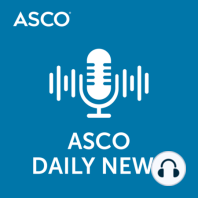44 min listen
Advances in Hematologic Malignancies at ASCO22
FromASCO Daily News
ratings:
Length:
16 minutes
Released:
Jun 22, 2022
Format:
Podcast episode
Description
Dr. Stephen Ansell, of the Mayo Clinic in Minnesota, tells host Dr. John Sweetenham, of the UT Southwestern Harold C. Simmons Comprehensive Cancer Center, about ECHELON-1’s compelling overall survival analysis in newly diagnosed Hodgkin lymphoma and key advances in the SHINE, MOMENTUM, and ASCEMBL trials that were featured at the 2022 ASCO Annual Meeting. TRANSCRIPT Dr. John Sweetenham: Hello, I'm Dr. John Sweetenham, the associate director for Clinical Affairs at UT Southwestern’s Harold C. Simmons Comprehensive Cancer Center, and host of the ASCO Daily News Podcast. My guest today is Dr. Stephen Ansell, a professor and chair of medicine at the Department of Hematology at the Mayo Clinic in Minnesota. Dr. Ansell shares his insights on key advances in hematologic malignancies that were featured at the 2022 ASCO Annual Meeting. Our full disclosures are available in the show notes and disclosures of all guests on podcasts can be found on our transcripts at asco.org/podcasts. Stephen, it's great to have you on the podcast today. Dr. Stephen Ansell: Thanks so much for having me, John. Dr. John Sweetenham: So, Stephen, I'd like to start with your thoughts on Abstract 7503, which of course is one that you authored, and this is a 6-year follow-up study of the ECHELON-1 trial. This includes a positive overall survival analysis for brentuximab vedotin in newly diagnosed advanced Hodgkin lymphoma. Can you tell us more about this? Dr. Stephen Ansell: Yeah, sure, John. And you know, as you point out, the thing that’s really interesting and unique about this trial is we haven't had a lot of studies in Hodgkin lymphoma that show an overall survival advantage as you well know. Doxorubicin, bleomycin, vinblastine, and dacarbazine (ABVD) chemotherapy has actually been quite difficult to beat when it's been an overall survival endpoint that one has been looking at. There have been some other strategies in the past that have been looked at—the escalation of therapies such as escalator BEACOPP, and maybe modification of therapy to minimize toxicity, such as the RATHL trial where bleomycin is dropped out. In all of these studies, there have been advantages for progression-free survival, but not clearly against ABVD as the standard and overall survival advantage. So, our listeners would probably know that ECHELON-1 was a comparison between brentuximab vedotin ABVD chemotherapy, and ABVD chemotherapy as the standard, showing an initially modified progression-free survival advantage and subsequently a progression-free survival advantage. But now with 6 years of follow-up, an overall survival advantage. And I think that's really what makes this quite unique. Dr. John Sweetenham: One of the reasons I think many people, myself included, thought that it was going to be a very high bar to show an overall survival difference in this study was simply the fact that treatments to relapsed and refractory Hodgkin lymphoma, in general, have improved really quite substantially, both before and during the conduct of this trial. Do you have any thoughts on that? Were you surprised? And any thoughts on why we're seeing this in the face of the rapidly evolving treatment landscape in the relapse setting? Dr. Stephen Ansell: Yeah, I think that's an excellent point. And, John, I think there have been 2 schools of thought, as you know, those that have felt that the first shot was always the best one. And you should go hard right off the bat and others have said, you don't need to give everybody intensive treatment, because as you say, subsequent therapies can be very effective. This would actually challenge that second position because when we looked at how patients were managed in both groups when they relapsed, the vast majority of relapsing patients in the group that got ABVD subsequently got brentuximab vedotin, as part of their regimen. Most patients—and it was balanced in both arms—got the standard kind of salvage treatment,
Released:
Jun 22, 2022
Format:
Podcast episode
Titles in the series (100)
Advances in Breast Cancer With Dr. Hope Rugo: Dr. Hope Rugo, professor of medicine and director of Breast Oncology and Clinical Trials Education at the University of California, San Francisco Helen Diller Comprehensive Cancer Center, highlights key studies in breast cancer featured at the 2021... by ASCO Daily News
